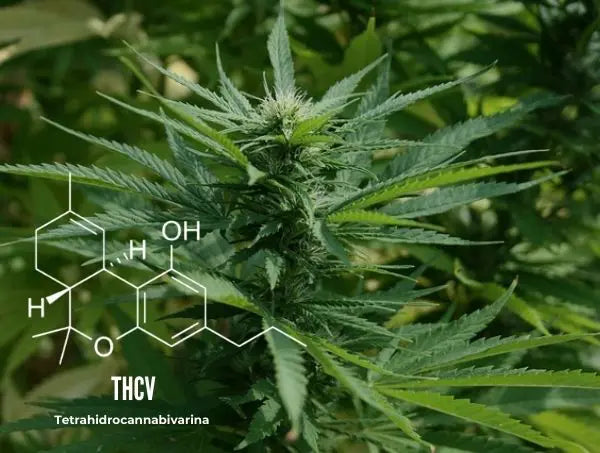The world of cannabis research is buzzing with discoveries, and one compound stealing the spotlight is tetrahydrocannabivarin (THCv). Unlike its more famous cousin, THC, which is notorious for sparking the munchies, THCv might just be the secret weapon for those looking to shed pounds. This cannabinoid, found in certain cannabis strains, is gaining attention for its potential to support weight loss by influencing metabolism, appetite, and energy regulation. But how much THCv is needed to achieve these effects, and what does the science say? Let’s explore the fascinating world of THCv, its dosing considerations, and its role in weight management, grounded in current research and practical insights.
Understanding THCv and Its Unique Properties
THCv is a naturally occurring cannabinoid in cannabis plants, structurally similar to THC but with distinct effects. While THC binds strongly to CB1 receptors in the brain, triggering appetite and euphoria, THCv acts differently. At low doses, it behaves as a neutral antagonist to CB1 receptors, potentially reducing appetite and the psychoactive high associated with THC. At higher doses, however, THCv can act as a CB1 agonist, producing mild psychoactive effects. This dual nature makes THCv a compelling candidate for weight loss, as its appetite-suppressing properties contrast sharply with THC’s hunger-inducing tendencies. Research also suggests THCv may enhance insulin sensitivity and regulate blood sugar, both critical factors in weight management.
The Science Behind THCv and Weight Loss
Scientific studies on THCv are still emerging, but early findings are promising. A 2016 study published in Diabetes Care explored THCv’s effects on patients with type 2 diabetes, a condition often linked to obesity. Participants receiving 5 mg of THCv twice daily for 13 weeks showed improved fasting glucose levels and pancreatic beta-cell function, suggesting better metabolic control. While the study didn’t directly measure weight loss, these metabolic improvements are closely tied to fat regulation. Another preclinical study on rodents, published in Nutrition & Diabetes in 2013, found that THCv reduced body fat and increased energy expenditure in obese mice, hinting at its potential to combat weight gain. These findings lay the groundwork for understanding THCv’s role in human weight loss, though more clinical trials are needed.
Finding the Right THCv Dose for Weight Loss
Dosing THCv for weight loss is tricky, as research is limited and individual responses vary. Most studies on humans have used doses ranging from 5 to 10 mg per day, often split into two administrations. For example, the Diabetes Care study used 5 mg twice daily, totaling 10 mg, which showed metabolic benefits without significant side effects. However, these doses were tested for diabetes management, not specifically for weight loss. Anecdotal reports from cannabis users suggest that doses as low as 2.5 to 5 mg of THCv-rich products may curb appetite, while higher doses (above 10 mg) might produce mild psychoactive effects, potentially counterproductive for some users. Starting low and gradually increasing is key, as THCv’s effects depend on body weight, tolerance, and metabolism.
Delivery Methods and Bioavailability
How you consume THCv matters just as much as the dose. THCv can be found in certain cannabis strains, such as Durban Poison or Doug’s Varin, or in isolated forms like tinctures, capsules, or edibles. Smoking or vaping delivers THCv quickly but may degrade some of the compound due to heat, reducing its effectiveness. Tinctures and capsules offer more precise dosing, with bioavailability estimated at 5-15% for oral consumption, according to pharmacokinetic studies on cannabinoids. Edibles, while convenient, have a delayed onset and unpredictable absorption due to digestion. For weight loss, sublingual tinctures or capsules may be ideal, allowing for consistent dosing and better control over effects. Always choose lab-tested products to ensure accurate THCv content.
THCv’s Role in Appetite Suppression
One of THCv’s most exciting properties is its potential to suppress appetite, a game-changer for weight loss. Unlike THC, which stimulates CB1 receptors to increase hunger, THCv may block these receptors at low doses, reducing cravings. A 2015 study in British Journal of Pharmacology found that THCv decreased appetite in animal models by modulating CB1 receptor activity. This could help individuals resist overeating, a major hurdle in weight management. Additionally, THCv may enhance satiety by influencing gut-brain signaling, making you feel fuller for longer. For those struggling with emotional eating or habitual snacking, THCv’s appetite-curbing effects could provide a natural alternative to pharmaceutical weight loss drugs.
Metabolic Boost and Fat Burning
Beyond appetite control, THCv may rev up metabolism. The 2013 rodent study showed that THCv increased energy expenditure, meaning the body burned more calories at rest. This is likely due to THCv’s interaction with TRPV1 receptors, which play a role in thermogenesis—the process of heat production that burns fat. By activating these receptors, THCv could promote fat oxidation, particularly in visceral fat stores linked to obesity-related health risks. While human data is sparse, these findings suggest THCv might complement diet and exercise by enhancing the body’s calorie-burning efficiency, making it easier to achieve a caloric deficit for weight loss.
Safety and Side Effects of THCv
THCv is generally well-tolerated, but it’s not without risks. At low doses (5-10 mg), side effects are minimal, with some users reporting mild dizziness or fatigue. Higher doses may cause mild euphoria or anxiety, especially in those sensitive to cannabinoids. Since THCv is often consumed via cannabis products, it’s crucial to consider the presence of other cannabinoids like THC or CBD, which can alter effects. Drug interactions are also a concern; THCv may affect liver enzymes, so consult a doctor if you’re on medications like statins or antidepressants. Pregnant or breastfeeding individuals should avoid THCv due to insufficient safety data. Always source THCv from reputable suppliers to avoid contaminants.
Practical Tips for Using THCv
Incorporating THCv into a weight loss plan requires strategy. Start with a low dose, such as 2.5 mg once or twice daily, and monitor effects for a week before adjusting. Pair THCv with a balanced diet and regular exercise to maximize results—cannabinoids aren’t magic bullets. Track your appetite, energy levels, and weight to gauge effectiveness. If using cannabis strains, opt for those high in THCv (typically 0.2-2% by weight) and low in THC to minimize psychoactive effects. Be patient; weight loss is gradual, and THCv’s benefits may take weeks to manifest. Consult a healthcare provider, especially if you have underlying conditions like diabetes or heart disease.
The Future of THCv in Weight Management
The potential of THCv for weight loss is exciting, but we’re only scratching the surface. Current research is promising but limited, with most studies focusing on animals or small human trials. Larger, long-term clinical trials are needed to confirm optimal dosing, efficacy, and safety for weight loss specifically. Regulatory hurdles also loom large—THCv’s legal status varies by region, often tied to cannabis laws. As cannabis research expands and stigma fades, THCv could become a mainstream tool for obesity management, potentially rivaling drugs like semaglutide. For now, it’s a promising option for those willing to experiment under medical guidance.
Conclusion: A New Frontier in Weight Loss
THCv offers a fresh perspective on weight loss, blending appetite suppression with metabolic benefits. While doses of 5-10 mg daily show promise in early studies, individual needs vary, and delivery methods matter. By curbing cravings and potentially boosting fat burning, THCv could be a valuable ally in the fight against obesity, but it’s not a standalone solution. Combine it with lifestyle changes, stay informed about emerging research, and consult professionals to navigate its use safely. As science catches up, THCv might just redefine how we approach weight loss, proving that cannabis has more to offer than just a high.
Reference:
1. Cengiz, A., Wu, C., & Lawley, S. (2025). Alternative dosing regimens of glp‐1 receptor agonists may reduce costs and maintain weight loss efficacy. Diabetes Obesity and Metabolism, 27(4), 2251-2258. https://doi.org/10.1111/dom.16229
2. Hill, A., Weston, S., Jones, N., Smith, I., Bevan, S., Williamson, E., … & Whalley, B. (2010). Δ9‐tetrahydrocannabivarin suppresses in vitro epileptiform and in vivo seizure activity in adult rats. Epilepsia, 51(8), 1522-1532. https://doi.org/10.1111/j.1528-1167.2010.02523.x
Kowalczuk, A., Marycz, K., Kornicka, J., Groborz, S., Meissner, J., & Mularczyk, M. (2023). Tetrahydrocannabivarin (thcv) protects adipose-derived mesenchymal stem cells (asc) against endoplasmic reticulum stress development and reduces inflammation during adipogenesis. International Journal of Molecular Sciences, 24(8), 7120. https://doi.org/10.3390/ijms24087120





Leave a comment
This site is protected by hCaptcha and the hCaptcha Privacy Policy and Terms of Service apply.